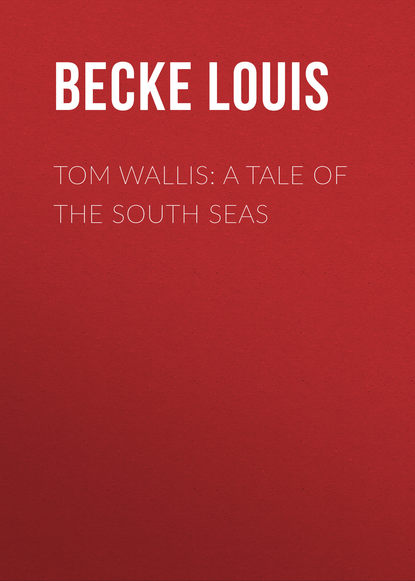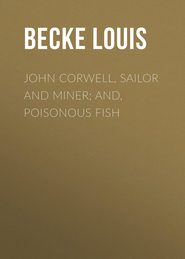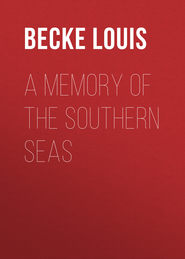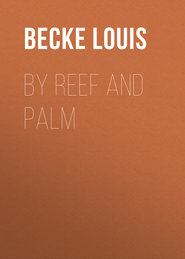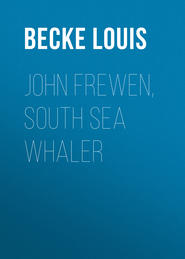По всем вопросам обращайтесь на: info@litportal.ru
(©) 2003-2024.
✖
Tom Wallis: A Tale of the South Seas
Настройки чтения
Размер шрифта
Высота строк
Поля
'Yes,' said Tom, 'seventeen dollars;' and he counted out seventeen pebbles.
'Six bottles of pickles, two bottles of chutney, and two bottles of green things like plums, one bag of oatmeal, and a tin box of raisins. How much for that lot?'
Bill was not sure. 'Say ten dollars.'
'Fourteen-pound box of "Two Seas" tobacco-Mr. Chester, you has a right noble mind to think of it, – three hanks twine, palm and sail-needles, one box fish-hooks, four pair dungaree pants, six dozen packets Swedish stinker matches, lot o' clay pipes all broken, three clasp-knives, and one tin o' mustard. How much?'
After a little discussion the lot was valued at forty dollars; and then the contents of the next bag were turned out. They consisted of about fifty pounds of biscuit, some tins of German sausage, a rug belonging to Mr. Kelly, a bag of bullets, a fan-tail hatchet, a bundle of fishing-lines, a burning-glass, a Dutch cheese in a tin, ten boxes of percussion-caps, and one bottle of Edinburgh ale.
'Put them down at twenty dollars, Mr. Wallis.'
The next 'lot' was rolled up in the steward's own blankets, and carefully seized round with spun yarn-three Snider carbines with three hundred or four hundred cartridges, the steward's own razor, glass, and comb, Tom's gun (that given him by the captain of the Virago at Noumea), some more tins of powder, caps, a bag of No. 3 shot, a bottle of one 'Kennedy's Medical Discovery for the Cure of all Diseases,' a bag of salt, a piece of New Zealand bacon, Mr. Harvey's revolver with case and fittings, a roasted fowl, and a sextant-case without the sextant.
'About a hundred and fifty dollars will square that lot,' said Maori Bill, thoughtfully.
In addition to these items, the steward and Bill had casually picked up some unconsidered trifles in the trade-room, such as bottles of brandy, a dozen tins of sardines and salmon, a bundle of tomahawks, some loose tobacco, and a German concertina, which were appraised at twenty dollars by Bill, who seemed anxious to give every article its full value.
'Two hundred and fifty-seven dollars,' said Tom, counting his pebbles.
'Then there's the boat and all her gear complete-sails, oars, and compass,' said Bill, virtuously. 'That's worth another hundred and fifty.'
Charlie grinned and shook his head. 'Don't count that in-the Leonie herself wasn't bought by Hayes; he found her. Found her in the Bonin Islands, when her captain and most of the afterguard was ashore drunk at a Portugee dance; and so, as he hadn't a ship himself, and was shocked at seeing such a fine brig being left in charge of a few Manila men sailors, he went aboard with a few of his friends-I was one of 'em-and lifted the anchor and went to sea to look for the owners. But he couldn't find the owners, though I've heard him say that he's just wearing out his life trying to find 'em, and has to go into nigger-catching to pay his expenses. No, you needn't set the boat down. Now, there we are; two hundred and fifty-seven dollars from four hundred.'
'Leaves a hundred and forty-three,' said Tom.
'That Bully Hayes owes us. Well, he owes a lot more to other people, so we'll forgive him our little bill,' said Charlie, as he began laying the various articles out separately on the rock, so as to dry in the sunshine.
Tom looked at the man in silence. He was tall and thin, with red hair, deep-set eyes, a square, determined chin, and a set mouth scarcely veiled by a straggling moustache and ragged beard of the same hue as his hair. His face, on the whole, Tom thought, was not a taking one; but his voice was pleasant, though a cynical and reckless humour was ever noticeable in his speech. Suddenly he turned and caught Tom's eye, and his cheeks flushed. He stood up stiffly and put his hand in his trouser pocket.
'Look here, Mr. Wallis! Don't you think I run away from Bully Hayes and the Leonie for the sake of these'-he held out the ten sovereigns which Tom had given him the previous night, and then let them fall carelessly upon the rock. 'I came with you and this man here because I was sick of the life I've led with Hayes for the past four years. Mind you, I'm not saying anything against the man; I like him. He did me a good turn when I was lying in gaol in Cape Town, and was as good as booked for ten years for smashing a man's-'
Bill strode forward and placed his brown hand over the sailor's mouth.
'Shut up, Charlie, shut up, I tell you!' he said in a savage whisper; 'what does this boy want to hear 'bout the doings of men like you an' me? It won't do him no good, I tell you; an' I won't have it. I'm no better than you, Charlie. I've been in goal for killing a man I didn't mean to kill, and I've suffered for it too. Don't let us talk 'bout such things-for the boy's sake.'
The white sailor immediately collapsed. 'Of course I won't. I'm not the man to shove my opinions on nobody, but Bully Hayes is not a bad sort.'
'He's not-with his mauleys. But he's not a better man with them than I am with mine, Charlie. If you don't believe me, wait till we get to Fiji, and I'll thump you and any other three men, one after another, in the yard at Manton's Hotel-for nothing.'
'Thank you, mister; you have a noble mind for trifles, as I said just now. But I take it for granted, and I'm sorry I spoke as I did before the boy. Now what about filling these water-breakers?'
The Maori put both his huge hands on the sailor's shoulders, and with a good-humoured smile forced him down upon the rock in a sitting posture.
'You sit down there and let me do that. You mus' look out that you don't hurt your arm. We may have to pull a lot between here and Fiji. And while I am filling the water-breakers you can fix up some fishing-lines. We can catch some fish here before we leave, and after we have stowed the boat again I'll get a hundred or so of young drinking coco-nuts.'
The remainder of the morning passed away pleasantly enough. Tom and Charlie, baiting their hooks with large fresh-water prawns, which were very plentiful in the creek, threw their lines out in the shallow water at its mouth, and soon caught some purple-scaled fish called by the natives afulu, and resembling English barbel in shape and size.
Meanwhile Maori Bill, after placing everything back in the boat, and filling the water-breakers, had walked along a narrow beach to where a grove of coco-nuts displayed their tempting fruit in great clusters. He ascended two or three trees, threw down a score or so of the young nuts from each, tied them together by tearing out a piece of each husk with his sharp teeth, and returned to the camp just as Tom and Charlie appeared with a string of fish and a huge soft-shell crab, which they had found lying in a weedy pool.
Bill's eyes glistened at the sight of the crab. 'That's a beauty! Let me feel him. He weighs ten pound. What a pity we can't light a fire and cook him! But, never mind, we'll cut him athwart-ships and rub some salt into him when we do the pig. The fish we can dry in the boat. Now what about some dinner?'
With a tin of what Charlie termed 'canned dog,' but what was really excellent American beef, half a dozen biscuits, and some deliciously sweet young coco-nuts, the three made a hearty meal. Then the two men filled their pipes and discussed their coming voyage while roughly salting the pig.
'I couldn't get a chart of Fiji,' said Bill, 'as Bully had locked his door when he went ashore. But it doesn't matter a bit. We have only to steer a course between S. and S.S.W. to hit the north end of Fiji. If we can strike the Nanuku Passage, I'll know my way right down to Levuka. They're a bad lot of natives in the northern part; but even if we have to land there, we'll get along all right without fighting, as I talk Fiji well. I had a Fiji girl for wife once; she came from just that part-from a little island called Thikombia.'
Just as they had finished salting the pork, and were about to stow the boat again, Charlie, looking up at the tree tops, remarked that the wind seemed to have fallen very light 'all of a sudden.'
Bill was on the alert at once. 'I'll have a look outside;' and he walked down to the mouth of the creek, from where he could have a good view of the sky and the sea horizon as well. He came back at a run.
'There's going to be a blow-a big blow from the eastward. Like as not it'll last for five days; three days for certain, anyway. We'll have to snug down here until it's over. Let's get the boat up as far as we can; there'll be a thundering big sea rolling right into the creek before night. Heavy rain is coming too, and we'll have to house in and weather it out.'
His suggestions were carried out as quickly as possible. Everything movable was first taken out of the boat, which was hauled still further up the little creek, and the stores were carried up to the fallen tree, and placed under its buttress, on the dry leaves which covered the ground. Then, leaving Charlie at the camp, Tom and Bill set off in search of fallen coco-nut branches to make a roofing. In an hour they had collected enough, and Bill at once set to work to make thatching, which he did with such speed and cleverness that Tom was lost in admiration at his resourcefulness. By four o'clock in the afternoon they had made the buttress of the fallen maso'i into a perfectly rainproof house, open to the westward, and protected at the back from the coming gale by the mighty trunk of the tree itself.
By this time the atmosphere had become intensely close and oppressive, and every now and then a warm gust of wind would sway the branches overhead. The calls of the forest birds had ceased, but vast numbers of ocean birds came flying in from seaward, filling the air with their hoarse, screaming notes.
'It's coming presently,' said Bill to Tom; 'don't you hear the sea making a booming noise? It always does in these places when it is coming on to blow from the eastward. When the natives of the Tokelau[4 - The Union, Ellice, and Gilbert Islands are now generally termed Tokelau by the inhabitants of the eastern islands of Polynesia. Formerly, however, only the low-lying islands of the Union Group were meant by the term.] Islands hear the sea make that sound, they know it means heavy weather from the eastward or the northward, and always haul up their canoes and secure their houses from the matagi afa,[5 - Hurricane.] as they call it.'
Before Tom could answer there came a droning, humming sound from the sea, and then a wild and deafening clamour, as the first squall of the coming hurricane smote the island, and ripped and tore its way through the forest.
'That's the first lot,' shouted Bill in Tom's ear; 'now we'll get some rain, and after that another squall or two and more rain, and then it'll settle down to business properly, and blow like forty thousand cats yowling at once. I'm glad we put in here.'
It certainly did settle down to business properly, for before another hour had passed the wind was blowing with almost hurricane force, and the sea was a succession of seething, foaming billows, which, dashing furiously against the eastern shore of the island, sent their spume and spray in a continuous misty shower, high up among the swaying and crashing branches of the trees half a mile inland.
Sitting under the shelter of the great tree, Tom and his comrades listened to the howling of the storm with feelings of the utmost serenity, for they were completely protected from its force.
'Let us light a fire,' said Bill, picking up a tomahawk; 'the smoke of fifty fires wouldn't be noticed now, and we can cook the pork and fish.'
The dead tree itself furnished plenty of firewood, and presently Bill and Tom had cut quite a pile; then the former went to the shore with a bag, and returned with it half filled with large, rough stones.
'I'll show you how we cook in the South Seas, Mr. Wallis,' he said, as he turned out the stones and began to dig out a shallow hole in the soft soil just in front of their shelter. This done, he lit a fire in the centre of the hole, laid a lot of thick pieces of wood across, and then piled the stones on top.
Then as the fire blazed up and began to heat the stones, he and Charlie took the four quarters of pork, cut them up into smaller pieces, wrapped each portion in wide green leaves and placed them aside; the fish were simply disembowelled without being scaled, and then neatly parcelled round with coconut leaf, the crab being treated in the same manner. In the course of an hour the stones, at white heat, fell into the depression, and were spread out evenly by means of a stick, the pork and fish placed on them, and then the whole lot quickly covered up by layers of thick heavy leaves, on top of which again was placed a covering of loose soil.
Whilst waiting for the food to cook, Tom and the others made their way through the forest to the nearest point overlooking the sea. The sky was grey and sullen, and the sea, a mile or so out, presented an appalling aspect; immediately under the lee of the island it was not so bad, though every now and then great billows would come rolling in to the very mouth of the creek, as Bill had foretold. Fotuna Island, although the nearest point, and but eight miles distant, was quite obscured from view, for, in addition to the salty spume which filled the air, there was a sharp, driving rain.
'Bill,' said Tom, 'where should we be now if we had kept on in the boat?'
Bill shook his head. 'We could only have done two things-either let her run before it, and most likely broach to and capsize, or put out a sea-anchor and tried to ride it out that way; but whatever we did we would have been carried away to the westward, and there's no land that way, except the New Hebrides-a matter of more than a thousand miles. I can tell you, sir, that it's lucky for us we left the Leonie without any water. If we had had water in the boat, I should have kept on.'
Returning to the camp before darkness set in, the oven was opened, and the three made another hearty meal by the light of a blazing fire. The two piglets were partially freed by being tethered with a bit of spun yarn to a hind leg. The boat was seen to, and then, spreading out the sail on the ground inside the hut, Tom and his comrades lay down and slept, undisturbed by the clamour of the sea and the moaning of the wind.
CHAPTER XVI
THE ENDING OF THE BOAT VOYAGE
For the following two days, during which time the gale still blew with unabated force, Tom and his companions found that time did not hang idly on their hands. The Maori had discovered a patch of wild yams growing in the mountain forest, and whilst he dug, and Charlie carried them down to the camp to be baked in preparation for the voyage, Tom was employed in shooting pigeons and manutagi, a species of ringdove, great numbers of which had been driven over to the lee side of the island by the storm.
On the afternoon of the third day the wind hauled round to the south-east, and towards evening it blew with but moderate force; the sea went down rapidly, the sky cleared, and by dawn the ordinary gentle trade had set in, and a deeply blue ocean lay shining and sparkling in the bright and glorious sunshine.





